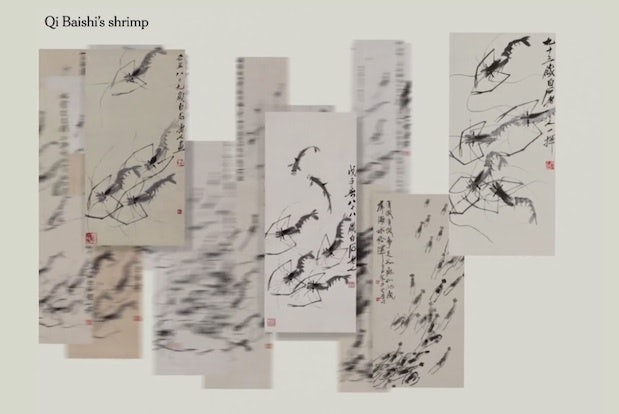Welcome to#
Jing Daily#
’s China Luxury Brief: the day’s top news on the business of luxury and culture in China, all in one place. Look below for the top stories for October 28, 2013.#

A shot from The New York Times' multimedia feature on China's fake art epidemic. Qi Baishi's paintings are especially prone to imitation. (NYT)
— BUSINESS & FINANCE —#
Is that Qi Baishi work you bought at auction real? Probably not.#
For its newest multimedia feature, The New York Times takes an in-depth look at China's problems with fake art. Quote from the article:
Even when you factor in faulty revenue reporting, the rise in art buying over the past decade has been meteoric, with Chinese banks, state-owned companies and business tycoons continuing to invest in the boom. Art has become a kind of currency, and collecting is so popular in China now that auctions are often mobbed. On Chinese television, more than 20 programs offer tips on collecting and on identifying cultural relics, and late-night infomercials promise quick riches to viewers who purchase a $2,500 collection of works by former students of renowned masters. Purchase today, the ad declares, and you can immediately secure a profit of $100,000. With so much at stake, Chinese art dealers have rushed to Europe and America to buy back Chinese relics.
(NYT)
China property firms see new market in "high-end" senior care.#
However, the market is uncertain. One especially sad quote: "it isn’t clear whether children will spend on their parents the same way they lavish money on their children." (China Real Time)
Chinese officials shamed over £70,000 pork tab.#
Another week, another corruption scandal. Beware before you click: gross pork-related photo. (Telegraph)
China luxury market makes luxury a good investment in the future, says market expert.#
"You have markets that are interested in conspicuous consumption, you have markets with an emerging middle class with a new set of disposable incomes." (The National)
— CULTURE —#
Nordic Design and Innovation Week hits Shanghai.#
To prove they have more design to offer to China than just Ikea, the Consulates General of Denmark, Finland, Norway, and Sweden will be holding 10 days of seminars, workshops, and exhibitions to showcase the region's design talent. (ArtInfo)
— FILM —#
Co-produced movies gain popularity in China.#
Not surprising, considering the foreign film quota. (ECNS)
— FASHION —#
Kenzo opens in Shanghai's luxe new L'Avenue mall.#
LVMH owns both the mall and the brand, showing that it's making strong efforts to diversify its revenue stream as Louis Vuitton's China growth slows. (WWD)
Lingerie trade shows hit Shanghai.#
A plethora of companies are competing to become China's Victoria's Secret as the middle class rises. (WWD)
Neiman Marcus buyout completed.#
The company scaled back its e-commerce operations in China this year, but has a 44 percent stake in China flash sales site Glamour Sales. (WWD)
— LIFESTYLE —#
GM has "laser-like" focus on luxury auto sector, says its China chairman.#
The company hopes Cadillac can grab a large chunk of the market share. (WSJ)
Tata’s JLR unit targets ultra-rich.#
As one of many luxury companies moving upmarket, Jaguar Land Rover's "first long-wheelbase sport utility vehicle for two decades marks a significant move to cater to wealthy, chauffeur-driven customers in places such as China, Russia and the Middle East." (FT)
Gold-plated Ferrari spotted in front of Shanghai hospital.#
Not quite as tasteful as the gold iPhone. Note the missing license plates. (Shanghaiist)
— TECH —#
Report: only 13 percent of Chinese consumers will buy smartphones that cost more than $330.#
This makes the iPhone all the more exclusive, although it's not clear if that's what Apple is going for. (Tech in Asia)
Registering a startup in China about to get "cheaper and easier."#
China will "streamline its corporate registration system by scrapping the minimum capital requirement, according to Xinhua." (Tech in Asia)